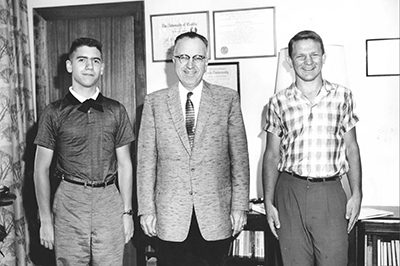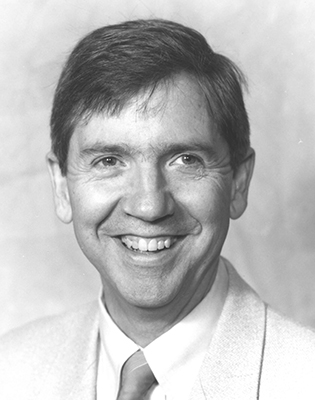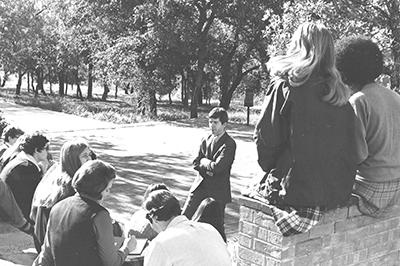 Menu
Menu



By Aspen Daniels Smith, BA ’19
Young Robert Scott Dupree, Ph.D., BA ’62, returned to UD in 1966, fresh from grad school at Yale, to teach this time. But he found a place he barely knew — so much had changed in the four years since his graduation as valedictorian of UD’s third class.
When he had first come as a freshman, the campus was a 1,000-acre wilderness with a few brick buildings. There was no Las Colinas, were no major highways, was not even a Northgate Drive and much less a rundown apartment complex across it.
From the slight rise of campus, the students looked out across empty land toward the Dallas skyline. To Dupree, it seemed like a distant civilization.
Almost everything that happened happened at Carpenter Hall. This two-story building housed the library, administration, academic departments and classes, and student lounge. Besides Carpenter there was Lynch Auditorium; a men’s dorm (now Anselm Hall), a women’s dorm (now O’Connell Hall), a chapel where the Drama Building is, and a tiny cafeteria that became the Margaret Jonsson Theater.
It was an intimate community, and Dupree was friends with most of the students in those first classes. But he couldn’t study in the dorm room he shared with three other guys.
“I sought peace and quiet by taking refuge in the broom closet down the hall,” he wrote in some personal notes.
So he gave up a scholarship that paid for his room and commuted from home.
About this time, Dupree overheard the first academic dean, Eugene Curtsinger, talking with a visitor in Carpenter.
“But what will you do for room?” the visitor asked.
“Oh, there’s plenty of room … outside,” Curtsinger shot back.
The students did enjoy the woods. They would spread out blankets to picnic and read. And that was where they threw UD’s first parties. They didn’t have a groundhog yet, so their campus mascot was “Pearl,” a stray dog that wandered into one of these parties. After the students shared their beer with her, the drunk animal made it to the nuns’ convent, where the nuns named her after the Pearl brew of beer.
When Dupree was a sophomore, Donald and Louise Cowan joined the faculty as chairs of the physics and English departments. Dupree took Louise’s survey of British literature and was blown away the first day she walked into class and began to lecture. Her love of poetry set her apart from anybody he had ever met.
“I would give up my life for poetry,” she told the class.
“I didn’t know anybody who would say, ‘I would risk my life for physics’ — you know,” Dupree said.
Her contagious passion inspired Dupree to dedicate his life to literature, first as a major and then as a professor now in his 56th year of teaching.
“She realized that a lot of what is central to our lives is summed up in works of the imagination, that we pass it off as entertainment and don’t realize that much of what we are is captured and reported in literature,” explained Dupree, affirming not just Louise’s belief but his own.
“But more than that, literature is also an experience,” he added. “It’s not just a message, it’s not just didactic — it expands our lives through the imagination that is crafted into works of art. And this is something I had never heard from anybody before.”
While he was still a student, Dupree watched the first two presidents and interim president come and go. The day after he graduated, the university chose Donald Cowan as its third president, and Dupree knew that this president would be different.
“Things are really going to happen now,” he thought.
It was at about that time that Louise asked him to come back and teach.
“At that moment I knew that my goal would be to return and help build the place to which they had already given so much, to say nothing of what I owed to them for what they had given me,” he wrote.
In the four years that he was gone, the Cowans had struggled to raise funds and establish the university’s reputation.
“The baby will live,” Louise Cowan finally wrote to Dupree while he was studying at Yale.
When Dupree returned, Gorman Lecture Center had just been finished, the mall was being built and the graduate program was about to open.
“I was at a different UD,” said Dupree.
The changes weren’t just physical; they were also academic.
“When I got back, I had to teach classes that I had never had myself … I’d had nothing that resembled the current UD Core Curriculum.”
The original curriculum was demanding but similar to other universities; students primarily learned from textbooks rather than original texts. In 1959, a few students read full works as part of a short-lived honors program. So Louise Cowan asked the other faculty members, “Why are not all our students honors students?” She sparked a transformation of the curriculum that started with the English Department and slowly spread across the university.
When Dupree was a student worker in the English Department, he overheard some of the teachers brainstorming about what would become the Literary Tradition sequence. They were all well-educated, but only in specialized domains. So under Louise’s leadership they met to catch each other up on the works and criticism each knew.
Looking back, Dupree is surprised that the Lit Trad curriculum hasn’t changed much even though the English professors were always tinkering with it.
“We were constantly trying things that didn’t work,” Dupree remembered. “And so we said, ‘OK, we won’t do that.’”
Through all the experimentation, UD’s educational model hasn’t changed.
“You know, you have to be ready to adjust constantly, but you have to bear in mind that there is a certain basis for all you do that you mustn’t violate, and that’s been the challenge all along: how to keep the spirit of things going, how to keep the whole communal aspect of the University of Dallas going,” said Dupree.